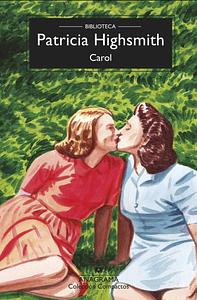Take a photo of a barcode or cover
emotional
reflective
slow-paced
Plot or Character Driven:
Character
Strong character development:
Complicated
Loveable characters:
Complicated
Flaws of characters a main focus:
Yes
I wasn't so sure about this book at first...Therese is interesting from the start, but it gets moving slowly. The interactions between her and Carol were confusing. Most of the dialogue was left out early on, except for times when Therese gave lots of one-word answers, which made it hard to tell what they thought of each other. Sometimes Carol seemed kind of mean. But then about 60% of the way in, it sped up and had somewhat of an unexpected storyline, and a fantastic ending. I cried!
medium-paced
Plot or Character Driven:
Character
Strong character development:
Yes
Loveable characters:
Complicated
Diverse cast of characters:
Yes
emotional
slow-paced
Plot or Character Driven:
Character
Strong character development:
Complicated
J'avais des attentes assez précises du fait de l'adaptation de Todd Haynes que j'adore et des articles que j'ai lus au préalable et globalement je n'ai pas été déçue. Le livre traite très joliment des relations lesbiennes, avec la tendresse et le respect qu'on retrouve dans le film, mais j'émets tout de même une critique quant au personnage de Carol qui par moment m'a semblé un peu trop "glamourisé" malgré son caractère presque tyrannique et son emprise sur Therese. Etait-ce volontaire, voulu comme une critique, ou bien était-ce plutôt une sorte de fantasme de l'auteure? Je ne sais pas. Cela ne m'a pas empêché de trouver ce livre extrêmement moderne de par multiples aspects. En effet, on y retrouve des situations, des remarques, des ressentis qui me semblent malheureusement encore totalement d'actualité et j'aimerais souligner (Sylvia Plath je te regarde) que Patricia Highsmith montre ici qu'il est tout à fait possible d'écrire , en 1952 (soit 10 ans avant La cloche de détresse), un roman sans remarques racistes (ni utilisation du n-word (ici je vise également Monsieur Stephen King)).
Le livre ne m'a pas pris avec autant d'émotion que le film, peut-être parce que je l'ai lu en anglais, qui n'est pas ma langue maternelle, ou bien parce que j'avais déjà vu le film, mais j'ai malgré tout adoré cette lecture, pour son histoire mais aussi pour ce qu'elle représente.
Le livre ne m'a pas pris avec autant d'émotion que le film, peut-être parce que je l'ai lu en anglais, qui n'est pas ma langue maternelle, ou bien parce que j'avais déjà vu le film, mais j'ai malgré tout adoré cette lecture, pour son histoire mais aussi pour ce qu'elle représente.
dark
emotional
mysterious
reflective
sad
tense
slow-paced
Plot or Character Driven:
Character
Strong character development:
Yes
Loveable characters:
No
Diverse cast of characters:
No
Flaws of characters a main focus:
Yes
This book definitely deserves a high place in the 20th century queer literature canon.
It offered its readers a glimpse of a non-pulp love story between two women in 1952, when their relationship was not only generally culturally taboo but also grounds for the loss of their social lives and even the custody of their own children. The conclusion of the novel even offers the protagonists a happy ending with a semblence of normalcy that doesn't involve either of them meeting 'the right man', or 'coming to their senses'.
The prose is just beautiful, and Therese is a captivating narrator who interprets and experiences the world around her with jarringly honest and raw language.
I just loved this book, for both purely stylistic reasons, and also for the narrative itself. I would definitely recommend it further.
It offered its readers a glimpse of a non-pulp love story between two women in 1952, when their relationship was not only generally culturally taboo but also grounds for the loss of their social lives and even the custody of their own children. The conclusion of the novel even offers the protagonists a happy ending with a semblence of normalcy that doesn't involve either of them meeting 'the right man', or 'coming to their senses'.
The prose is just beautiful, and Therese is a captivating narrator who interprets and experiences the world around her with jarringly honest and raw language.
I just loved this book, for both purely stylistic reasons, and also for the narrative itself. I would definitely recommend it further.
reflective
medium-paced
Plot or Character Driven:
Character
Strong character development:
Complicated
Loveable characters:
No
Diverse cast of characters:
No
Flaws of characters a main focus:
Complicated
medium-paced
I read this because someone made a film out of it, so i wanted to see what it was about. The book is extremely verbose, many "big" words that could have easily been reduced. The writing style is dated, it sounds like a high school student who is trying to sound smart, pulled out a dictionary. The interaction between Carol & Therese is interesting to say the least. Patricia does paint very vivid pictures of what's going on in the scene. It's a good read if you want to learn some new words, and read a very important story about the history of LGBT couples.







